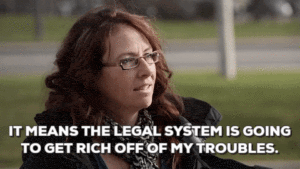The Common Sense Guide to:
The Divorce Process In Ontario
How to Begin a Divorce Process
Financially Smart Divorce Strategies
What is The Divorce Process in Ontario?
Common sense says that your divorce process is about legally instituting a separation plan that allows you and your family to make decisions, protect your interests, and move on with your life. This usually involves a combination of financial disclosure (revealing all of your finances to each other), negotiating and signing a Separation Agreement that addresses all the issues.
Once all the contested issues are resolved, you can then apply for your divorce decree.
Is There a Difference Between Separated and Divorced?
In Ontario, there’s really no such thing as being “legally separated” the way you see in the movies. If you’re not divorced, then you are still legally married until you’re formally divorced. One year from the Date of Separation, you can apply for your Divorce Decree.
In the meantime, you and your spouse should use that year to create a Separation Agreement that legally dictates how you will deal with your children, your home, all of your assets, your pensions, debts, and any support issues.
Creating a Separation Agreement
This means that the important document is NOT the Divorce Decree… the most important document is your Separation Agreement.
Your Separation Agreement is the most crucial step in the Ontario divorce process and is likely to be the most important document you ever sign. Do not approach this task lightly, and do not simply put your faith in a homemade agreement or assume the equanimity of the family court system.
The court system is expensive, severely over-burdened, and often abused. Below is a simplified road map of what’s involved in the divorce process in Ontario.
The Unofficial Rules of Divorce:
Divorce gets prickly, even in the most amicable situation
It’s often less about the legalities and more about the money
People make expensive mistakes because they don’t make a plan
Before you do anything, understand your rights, obligations & complexities
Thinking of Divorce? First Things First
How much a divorce will cost, how acrimonious it will be, and what the future looks like, is decided by you… right now – before your first move.
STOP - BREATHE - THINK
Before anything, do your homework. Know your gameplan.
ASK YOUR SELF THESE 10 QUESTIONS:
- Am I ready to make a decision – be it to stay or to leave?
- Is now the best time to separate?
- If I decide to stay, what are the financial, emotional or safety risks?
- What do I have to do to create a smart financial plan for myself (and my children?)
- Do I understand how Ontario Law divides our stuff; both our assets and our debts?
- Do I actually know what’s involved with Child or Spousal Support?
- Does it make sense to try and keep my home or can I make a wiser money plan?
- If my spouse is “difficult,” do I have a solid strategy on how to navigate through this?
- Can I articulate my negotiation options and then choose the wisest legal process for my situation?
- What can I do now to land on the best foot forward for myself (and my children?)
BEFORE YOU HIRE A LAWYER, MEDIATOR OR GO TO COURT
Gain Confidence, Clarity and a Strategic Plan
Discover Your Next Steps
For ONLY $399
Feeling lost in the maze of separation? Our 90 Min Divorce Discovery Zoom Session cuts through the confusion and will help you make a decision, make a plan and understand your first steps.
SOLO
Discovery Session
$399
For individuals who have not yet made a decision or need to empower themselves with the right information. The SOLO Discovery Session will answer your questions, explain Ontario Law in simple English and give you the information you need to make your next decisions.
uidance before talking to your spouse
Understand your rights & options
Learn how to start the conversation
JOINT
Discovery Session
$399
For couples seeking a legally smart and financially-savvy divorce. Addressing misconceptions and understanding options together is invaluable. The JOINT Discovery Session will align you and your spouse with facts—not opinions— the first step towards a smarter separation.
Be on the same financial & legal page
Whether attending solo or jointly as a couple, we will help you keep your separation straight-forward, amicable and cost effective.
It’s straight talk about the legal and financial realities of divorce in Ontario.
Get the information you need to make informed decisions. Don’t guess—get real answers now.
Ready to move forward?
Book Your Discovery Session Now
1866 748-6363
How to Start a Divorce Process in Ontario
VERY IMPORTANT: Date of Separation
To formally start the divorce process in Ontario, you must clearly inform your partner of your intention to separate. The date of this discussion usually becomes what is known as your Date of Separation. This date is very important as it is used for valuations, dividing up your assets, financial disclosures, support payments, and your divorce application once you have completed your Separation Agreement.
What is Financial Disclosure?
Financial disclosure is when each spouse gathers a copy of all their financial information to legally ensure that the other spouse has a full account of their situation before any decisions are made. This is extremely important!
For your Separation Agreement to be considered legal, binding, and enforceable, both spouses must provide full financial disclosure. The Province wants to ensure that decisions are made based on all the numbers and facts.
“All Financial Accounts” means disclosing all chequing accounts, savings, investments, mutual funds, pensions and retirement accounts, business valuations, life insurance policies, etc., that you have an interest in, as well as a full record of all debts.
The account numbers, the name of the financial institution, the value as of the date of your separation, and the current value must be disclosed. This is one of the most important parts of the divorce process, as the courts can set aside a Separation Agreement if a spouse fails to disclose significant assets or debts.
Gathering and reviewing you and your spouse’s financial information is a long and arduous task. Before you swear that your financial statements are true and complete, you NEED to be sure that you have included everything required. A failure to complete proper financial disclosure is one of the main reasons that Separation Agreements are thrown out in court.
Do I Need to Value My Pension for a Divorce?
If you have a pension, as part of the financial disclosure process during a divorce, you will need to speak to the Human Resources Department at your place of employment and request a pension valuation for family law purposes. To properly value a pension, you are required to obtain the Family Law valuation of the pension, as your regular statement is not acceptable for the disclosure process. This typically takes a few months from when you request it from your employer.
All pensions will be divided in the case of divorce. It’s important to understand that a pension valuation is very different from a pension statement, and it is not unusual for two pensions with similar statement values to have drastically different pension valuations for the purposes of family law. Valuations can be a huge challenge and come with serious tax implications.
Is My Business Included in Divorce?
Have Your Business Valued (if you are self-employed). If you work for yourself, depending on your business structure, as part of the divorce process in Ontario, you may be required to value your business or corporate assets such as vehicles, real estate, or items owned by your company.
If you work for yourself, expect this to add a layer of complexity to your negotiations for the following reasons:
- Your true income is likely not reflected in your tax returns due to deductions, write-offs, and exceptions.
- You will be expected to negotiate and determine your real income.
- You will need to agree on the value of the business.
Divorce and Home Appraisal
When you go through the divorce process in Ontario, the matrimonial home will be sold. It will either be sold to you, your spouse, or a third party. If you choose to sell to a third party, the value of the home will be whatever you can sell it for. However, if you or your spouse chooses to buy the other out, you will need to get your home properly appraised by a licensed home appraiser.
Remember that when you sell your house, the sale funds will be placed in trust with your Real Estate Lawyer (different from a divorce lawyer). As a Separation File, your sale funds will not be released until there is a proper and legal Separation Agreement in place that tells them how to divide the money.
The Divorce Process and Child Support in Ontario
You and your spouse will need to formalize where your children will live and how each parent will have access to the children. You will need to coordinate GST/HST and Canada Child Benefit credits, create a benefits plan detailing how medical, dental, optical, and other expenses are paid, and determine how special or extraordinary expenses will be managed.
In Ontario, child support is considered the right of the child rather than a right of the parent, and both parents must contribute. You cannot opt out of paying child support, and you cannot negotiate a different amount without special cause.
The amount paid is based on a monthly amount derived from the Ontario Child Support Guidelines, known as the table amount. The only factors that influence child support are the payor’s income, the number of children, and the province where the payor lives.
Making the Decision to Separate
Separating is not an easy decision, and it’s one that shouldn’t be taken lightly. Before you begin any formal divorce process, you’ll need to end your relationship with your spouse and determine that there’s no possibility of reconciliation. This may mean attending marriage counselling together.
In many cases, the spouse who initiates the decision to separate has been considering it for months, if not years, while the non-initiating spouse may have just learned about it. If you are the initiating spouse, be aware that your soon-to-be ex may need some time to come to terms with the decision.

Choose Your Negotiation Process
When preparing a Separation Agreement, you don’t need to go to court to negotiate your personal matters. In most cases, it will be significantly faster and far less expensive if you and your spouse can negotiate without involving the court. In fact, the average cost of a contested divorce in Ontario is nearly $27,000 (and that's per spouse!). If you decide to drag your spouse to trial, you can expect to pay an average of nearly $45,000.
Typically, people consider one of four negotiation options to handle their Separation Agreement:
1. Litigation Lawyers
2. Divorce Mediation
3. Collaborative Negotiations
4. DIY (Do It Yourself)

DIY Divorces Homemade Separation Agreements
Do-It-Yourself (DIY) Separation Agreements may seem like a cost-effective option, but a poorly prepared agreement can cost you big time in the long run, especially when you’re trying to fix what wasn’t prepared properly from the start.
Here’s the thing most people don’t realize about those who end up down at Family Law Court. While some court cases involve couples who simply refuse to agree on anything, many others are the result of poorly prepared homemade separation agreements that were thrown out of court and had to be re-litigated.
Divorce isn’t the end of the world, but it can sure feel like it if everything devolves into a financial disaster.
You need clarity, fairness, and a plan that actually makes sense—because your future deserves better.
The Common Sense Divorce focuses on what really matters—keeping your family’s stability intact.
With 25+ years of no-nonsense financial advice on TV, radio, and as a best-selling author, Gail Vaz-Oxlade brings her financial common sense to divorce.

Divorce isn’t the end of the world, but it can sure feel like it if everything devolves into a financial disaster.
You need clarity, fairness, and a plan that actually makes sense—because your future deserves better.
The Common Sense Divorce focuses on what really matters—keeping your family’s stability intact.
Negotiate and Determine Spousal Support
The law views marriage as a partnership, meaning that when you marry, there’s no such thing as “your income” and “my income.” Instead, it’s the combined and shared household income earned as a couple. The government has provided high and low guidelines to help calculate the appropriate amount of support.
Spousal support should always be properly calculated and clearly understood by both you and your spouse. You have options regarding how to receive support, whether as a lump sum or through monthly instalments over a few years. Each option has very different financial, legal, and emotional implications.
Always remember that spousal support can be a double-edged sword—more isn’t necessarily better. There are tax, benefits, and mortgage implications attached to the amount of support paid or received. In fact, recent changes to lending rules have led some banks to refuse mortgages to individuals where spousal support constitutes over 30% of their income.
Do I Really Need Independent Legal Advice?
One of the main reasons Separation Agreements get thrown out by the court is that one or both spouses didn’t fully understand the consequences of the agreement they signed. When each spouse receives independent legal advice (and remember, by law, a lawyer can only represent one spouse), the lawyer will explain all aspects of the agreement and how it will affect their lives moving forward. They will also identify any troubling or illegal clauses that could otherwise invalidate the agreement.
This version ensures the content is clear, practical, and written in Canadian English, offering straightforward advice on negotiating spousal support and the importance of independent legal advice during the divorce process.
How Are Assets and Debts Divided When You Separate?
You will need to decide how to split all of your assets and debts accumulated during your relationship. Remember, there is no such thing as “your stuff” and “my stuff” when you are married. By getting married, you chose to combine your finances, including all the possessions shared during your marriage.
The key to dividing assets is not worrying about who gets what, but rather protecting your money from excessive taxation.
The Matrimonial Home and the Divorce Process
In Ontario, if you are married, both spouses have the right to share in the equity of the matrimonial home that was incurred while you were married. It doesn’t matter whose name is on the deed, even if one of you owned the home before you were married. The first thing you must figure out is whether you or your spouse will buy the other out or if you will sell the home to a third party.
Whether you decide to sell the home or buy out your spouse, you will need to qualify for a new mortgage when you purchase a new home or refinance the matrimonial home. Working with a financial professional will ensure that you are set up to qualify for the new mortgage and won’t have to tear up your agreement if you realize you don’t.
Splitting Investments & Debts
All investments in your name, your spouse’s name, and jointly will be equalized between the two of you. This does not mean simply taking everything and dividing it by two. There are very real financial and tax implications involved with splitting assets and debts, especially when it comes to financial investments.
You will want to consider the differences between market value, book value, and cash value of an investment, as well as the value after taxes.
For many people, retaining a financial professional who specializes in divorce to assist with the division of investment assets is well worth the cost. Similarly, with debts, depending on whose name the debt is registered against, you may still be liable to repay a debt in your name, even if your spouse has agreed to pay it. Therefore, these matters need to be dealt with properly and legally.
How to Apply for an Uncontested Divorce
Once you have addressed all the issues above and completed your Separation Agreement, you can apply to the court for an uncontested divorce. The court is the only institution that has the power to officially grant your divorce.
You will need to have lived in Ontario for over one year, be separated from your spouse for at least one year, and must file at the court in the municipality where you or your spouse lives.
Negotiating Your Separation Agreement
Your Separation Agreement is the most important document you will create, and your focus should be on that before you think about the formality of going through with a divorce. However, there are some reasons why you will want to get the divorced once that is completed.
One of the more important reasons is that Ontario does not distinguish between “married” and “separated”, which means that until you are divorced you are still considered to be married to your spouse in the eyes of the law.
One of the implications of this is that, regardless of what your Will states or the fact that you have separated, your spouse will be entitled to a portion of your estate. Another reason to consider divorce is that, in Ontario, you cannot re-marry until you have divorced.
The last main reason is that, as their legal spouse, there is a possibility you may be liable for debts that they incur down the line.
How to Avoid A Messy Divorce
Seriously consider mediation before lawyer litigation
If at all possible, stay out of the Family Courts
Gather and organize your financial documents
Do your homework, understand how divorce works in Ontario
The Divorce Process and Your Negotiation Options
Realistically, in Ontario, here’s what you can expect from the various legal and divorce processes. Each option has its positives and negatives. Your challenge is to find a divorce process that works best for you, keeping your children and your finances in mind.
What is Divorce Mediation?
Increasingly the norm for the divorce process in Ontario, family mediation is often the best option for most people. In fact, all courts in Ontario now require that every individual attend a mandatory information session explaining mediation and other options before attempting to litigate.
Typically the fastest and most cost-effective divorce process, mediation offers a confidential, non-adversarial environment where divorcing spouses can negotiate their own settlement with the aid of an impartial third party. There are mediators who are lawyers and those who are not, with ongoing discussions about which are better.
The skills that make a good mediator are very different from those that make a good lawyer….
- COST: Good family mediators typically charge between $200 and $350 per hour. Expect most couples to require 12 to 25 hours to complete their Divorce Agreement.
- TIME: Mediation is very dependent on you and your spouse. Since you’re dealing with only one professional, a mediator can often move at a pace you establish. However, realistically, plan for your mediation to take 2 to 5 months to complete (often due to waiting for documents).
- POSITIVES: Mediation is undoubtedly faster and cheaper than all other processes. Statistically, mediation has the highest “stick factor,” meaning that agreements created in mediation tend to last longer, likely because this is an agreement that you and your spouse agreed to together.
- NEGATIVES: Because people know that mediation is cheaper and faster, they sometimes try to force unrealistic situations into mediation. Mediation is not for everyone or every situation. Some divorce cases require different approaches, which won’t be cheaper or faster.
- OTHER CONSIDERATIONS: Your mediator will advise you to seek independent legal advice (ILA), which is not included in the price of most mediation packages. Make sure you ask how long it takes your mediator to draft your agreement. Some mediators can draft it quickly, while others require many hours. Being a good mediator doesn’t necessarily mean they are quick on the computer, and this drafting time is billable hours that you will pay for.
What is Collaborative Negotiation?
In the collaborative divorce process, you and your spouse work with a team of lawyers and other professionals as needed to keep your divorce negotiations on track and out of court. Essentially, you sit at the same table with each of your lawyers and negotiate all the issues together.
If you need special assistance with issues like children, parenting plans, or finances, other professionals can be brought in to assist with the negotiations.
- COST: In Ontario, most collaborative lawyers charge between $275 and $550 per hour. Expect most couples to require 20 to 35 hours to complete their Divorce Agreement, and each of you will pay for your own lawyer.
- TIME: Collaboration is not as fast as mediation but certainly faster than litigation. The biggest challenge with collaborative law is often coordinating schedules for four busy people (you, your spouse, and your two lawyers) to meet. Typically, completing your divorce through a collaborative process will take about 6 to 8 months.
- POSITIVES: Collaborative negotiations are faster and cheaper than litigation and court. Collaboration works well for individuals with many details to sort out or where the acrimony level is getting high.
- NEGATIVES: Collaborative law is very trendy. Many litigation lawyers are seeing the business potential and are taking two-week courses to become “collaborative lawyers.” A shiny new title doesn’t necessarily make a lawyer truly collaborative. A true collaborative lawyer requires a very different set of skills and negotiation style from the typical Rottweiler litigation lawyer. Make sure your collaborative lawyer really is collaborative.
- OTHER CONSIDERATIONS: Find out whether your lawyers will be signing a collaborative agreement. Your lawyers will agree that going to court is not an option in this negotiation process, and if the case goes to court, both lawyers must resign to avoid any conflicts of interest.
Unsure Which Legal Option is Best for You?
Avoid costly mistakes—know your rights and responsibilities in Ontario. Move forward with a solid plan! Answer a few quick questions and instantly receive your FREE Ontario Divorce Plan specific to your situation. Start now and take control of your future!

Question #1
What is your greatest concern
about Divorce?
What is Litigation & Family Court?
A traditional lawyer-led divorce process means hiring a Family Law lawyer to represent you in negotiations with your spouse. Your spouse will hire their own Family Law lawyer, and the two lawyers will negotiate back and forth.
When you hire a traditional Family Law lawyer, they will typically try to negotiate without going to court but may approach the courts to address various issues along the way. If you do go to court, the judge will usually send you and your spouse to a case conference or case settlement, which is essentially a form of mediation or collaboration.
People very rarely go to trial. It’s very expensive, takes months, if not years, to get there, and is typically the most acrimonious of processes.
- COST: Established Family Law lawyers in Ontario charge between $375 and $600 per hour. Litigation lawyers are the traditional norm most people think of first when facing a divorce. Expect most couples to require 20 to 35 hours to complete their Divorce Agreement, and each of you will pay for your own lawyer. Your litigation lawyer will typically require an initial retainer of about $3,000 to $5,000, and you will likely need to refill this retainer two or three more times.
- TIME: Plan for 9 months to 2 years (longer if you go to trial). Litigation law is without a doubt the slowest process for several reasons. Because you’ve chosen to litigate, everything must be done according to a process. This means that letters must be sent back and forth and everything tracked. Each side will be given several weeks to respond.
- POSITIVES: It’s effective. If your spouse is being completely unreasonable or unresponsive, litigation may be your only option. Let’s face it: nothing gets someone’s attention like a strongly worded letter from a lawyer, followed by a meeting with the court if necessary.
- NEGATIVES: It’s expensive. Plan for lawyer-led negotiations to cost each of you $10,000 to $20,000. If you want to spend money spanking your spouse, there are litigation lawyers who will gladly take your money—and a lot of it. People often let their emotions run wild during divorce and like to use their lawyers as a baseball bat. In reality, most people run out of money in the midst of the legal due diligence process, and it can seem like nothing was actually accomplished.
- OTHER CONSIDERATIONS: Understand how your lawyer communicates. If they’re in court all day, they won’t be answering your phone calls. How do they bill? Most lawyers bill in 6-minute increments, which means that if you’re paying them $400 per hour, reading your two-line email just cost you $40. Lastly, cheaper isn’t necessarily worse, and more expensive isn’t necessarily better. Lawyer rates go up with each year they are in business. There are $500-per-hour lawyers who can do more in one hour than a $275 lawyer can do in three hours. Conversely, you could be paying $500 per hour for a lawyer to write things out on paper simply because they are old-school and prefer not to use modern technology.
What is D.I.Y. (or Do It Yourself) Divorce?
“How do I create my own Separation Agreement?”
The internet has increased the number of individuals wanting to either create their own separation agreement or represent themselves in court. You can now buy separation agreement templates online, and in some Ontario courthouses, self-represented litigants make up almost half of the court’s dockets.
Typically, people choose a DIY divorce process for various reasons, ranging from trying to save money, to disliking lawyers, to full-fledged intentions to manipulate or cheat their spouse.
- COST: Potentially cheaper. Depending on what you’re attempting, you can save money with a DIY divorce. For instance, creating and filing your own Uncontested Divorce or other court documents can save you hundreds of dollars if you’re willing to do the legwork. Other DIY technologies are now helping people prepare Parenting Plans and file their Financial Disclosures, saving numerous billable legal hours. Still, when it comes to preparing a separation agreement or litigating in court, the market remains buyer beware. Research has confirmed that most DIY files end up costing more in the long run. You may even have to hire litigation lawyers to fix what wasn’t done properly to begin with.
- TIME: Potentially weeks, probably months to years. It seems that DIY divorce can allow people to fly through their separation in weeks or months. In reality, DIY files usually prove to be the longest and most convoluted in the big picture.
- POSITIVES: If you and your spouse can work together, some DIY processes can drastically reduce the cost of your file. Consider using DIY technologies to help you organize your financial disclosure and manage your parenting arrangements.
- NEGATIVES: You get what you pay for.
- CONSIDER ALSO: Your Separation Agreement will likely be the most important document you ever sign. Ensure that it is prepared properly, legally, and is enforceable going forward. Remember that having a lawyer notarize your homemade agreement does not constitute independent legal advice and, in reality, means nothing.
CREATING A NEW FUTURE?
Choose the RIGHT solution!
Do you want to understand how Online Mediation can work for you? Book a free JOINT TELEPHONE CONSULT for you and your Spouse. We will gladly explain the entire process and its benefits.
Frequently Asked Questions about The Common Sense Divorce Process
My partner and I are Not amicable. Can we still use The Common Sense Divorce?
In general, most partners facing divorce are not amicable with each other. The Common Sense Divorce was designed to be just that—common sense. Rest assured that our professional team is trained to manage conflict and facilitate resolution, even in difficult situations.
Does The Common Sense Divorce Use Lawyers?
The Common Sense Divorce is a team of expert mediators, lawyers, financial professionals, and counsellors, all committed to following The Common Sense process.
Do I Have to Retain a Family Lawyer in Order to Divorce in Ontario?
No, you are not required to retain a lawyer to divorce in Ontario. Still, common sense suggests that seeking legal advice is a wise decision. The Common Sense Divorce includes expert legal services, offering access to family lawyers, self-facilitated legal services, and independent legal advice.
